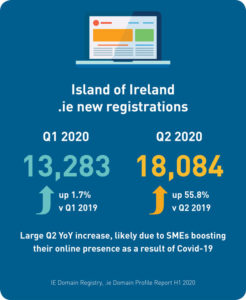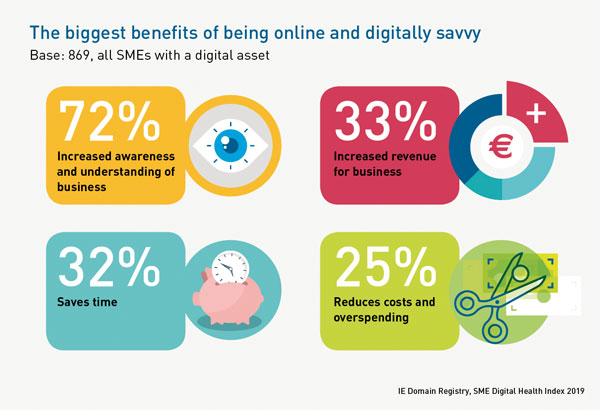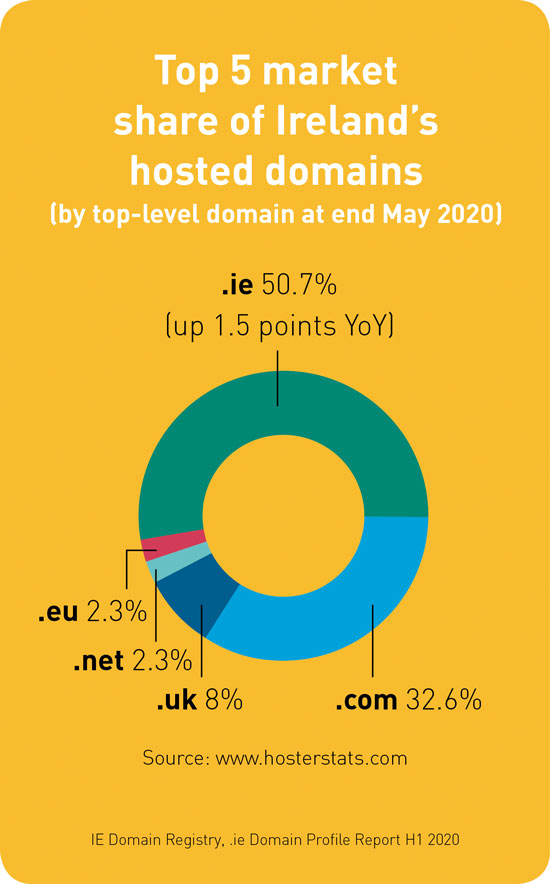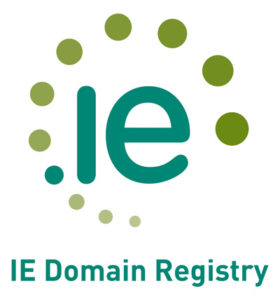New .ie registrations surge as businesses move online in response to the Covid-19 pandemic

The significant digital growth suggests that businesses and entrepreneurs recognise that an online presence is essential in order to maintain and grow revenue writes David Curtin, CEO of IE Domain Registry, the company that manages .ie, the preferred online address for business in Ireland.
According to our latest .ie Domain Profile Report, new .ie registrations in the first six months of 2020 grew 26 per cent compared to the same period last year. The strong year-on-year growth in new registrations can be linked to the Covid-19 pandemic and lockdown. Over 40 per cent of new .ie registrations on the island of Ireland occurred in the two months of May and June, as businesses responded with online services, following the Government’s ‘work from home’ order which closed most of the country’s business premises. Overall new registrations in Ireland during Quarter 2 increased 56 per cent year-on-year. As a reliable forward economic indicator, this is a clear statement of intent by Irish business.

With main streets temporarily shut down, the increase suggests that more companies, self-employed business owners, and independent professionals have gone online since the lockdown to maintain their revenue streams, stay in contact with customers, and expand into new markets. The Covid-19 pandemic has had a noticeable effect on new .ie registrations across virtually the entire country. 31 of the island’s 32 counties recorded an increase in the first six months of 2020.
Consumer preference
Buying Irish has always mattered to consumers. Our SME Digital Health Index 2019 research revealed that 81 per cent of consumers believe that buying Irish is important. The Covid-19 pandemic and lockdown has created a sense of solidarity amongst consumers who know that without their support, many Irish businesses will never reopen. This has encouraged consumers to look closer to home for goods and services and support Irish businesses through this challenging period.
Data currently available suggests that Covid-19 will be with us for the foreseeable future. Until an effective treatment or vaccine is found, social distancing, queues and capacity limits are here to stay. Businesses all over the world are likely to be engaged in some form of restricted trading. Consumers are aware of this, and online shopping offers them a way to avoid inconvenience and crowds. Covid-19 has, for now, made many wary of in-store shopping. Consumers are also more open to interacting with professional services online through virtual consultations in areas such as banking and finance and health, with online medical consultations on the rise.
Before Covid-19 was a reality, most consumers wanted the option of an “omni-channel experience”, where their shopping needs are met by a seamless combination of traditional main street retail, online, and e-commerce. This has accelerated in the current Covid-19 environment. SMEs who are flexible enough to facilitate both will attract more customers and be able to better compete with international online retailers. The same can also be said for those providing services and B2B businesses. For example, if someone is looking for an architect or solicitor, they will check online and gauge the company on the quality of its website. Video conference tools, such as Zoom, are proving to be a good substitute for the personal touch in selling the professional service, while Covid-19 prevents physical meetings. SME websites and promotion of their online services will be critical in encouraging consumers to transact with them.

SME response
The significant increase in .ie registrations indicates that all business owners and entrepreneurs, in cities and in regional parts of the country, understand that having a trusted, uniquely Irish online presence is absolutely crucial in a time of lockdown, when nearly all physical premises are shut and footfall is extremely low or non-existent.
Having an online presence means that these businesses can stay in contact with their customers, build on their relationships, and, most important of all, continue to sell to them through an online store, click-and-collect service, or appointment booking systems.
 However, according to our SME Digital Health Index 2019 research only a minority of Irish SMEs (32 per cent) can actually sell online despite online spending being the norm among Irish consumers. E-commerce is worth a great deal to the Irish economy with the Central Bank estimating that Irish consumers spent €16 billion online in 20191, a figure that has risen consistently over the last decade. Our research has shown some SMEs are slow to move online, citing not enough time, that they are already doing enough online, lack of digital skills and that the array of choices can be confusing. Covid-19 has forced consumer purchasing habits to change. Many businesses have responded and quickly adapted to this and moved online or enhanced their online presence in order to survive. The Future of Business Survey2, run by Facebook in collaboration with the World Bank and the OECD surveyed SMEs with an active Facebook page. It revealed that over 40 per cent of Irish SMEs adapted to the pandemic by setting up a website or online business presence — one of the highest figures globally.
However, according to our SME Digital Health Index 2019 research only a minority of Irish SMEs (32 per cent) can actually sell online despite online spending being the norm among Irish consumers. E-commerce is worth a great deal to the Irish economy with the Central Bank estimating that Irish consumers spent €16 billion online in 20191, a figure that has risen consistently over the last decade. Our research has shown some SMEs are slow to move online, citing not enough time, that they are already doing enough online, lack of digital skills and that the array of choices can be confusing. Covid-19 has forced consumer purchasing habits to change. Many businesses have responded and quickly adapted to this and moved online or enhanced their online presence in order to survive. The Future of Business Survey2, run by Facebook in collaboration with the World Bank and the OECD surveyed SMEs with an active Facebook page. It revealed that over 40 per cent of Irish SMEs adapted to the pandemic by setting up a website or online business presence — one of the highest figures globally.
SMEs’ ability to cater to consumer choice and comfort by providing online and in-store shopping or face-to-face experiences, will be key to the country’s economic recovery in 2020 and beyond. Businesses should make every effort to access e-learning opportunities from organisations such as the Local Enterprise Offices and access available government funding to assist them in their digital development. SME representative organisations have successfully demonstrated to government that SMEs truly are the backbone of the Irish economy and an unprecedented amount of funding has been made available to support them.
Power of a uniquely Irish .ie online address
According to HosterStats.com, .ie is the leading active domain in Ireland and growing faster than .com. Business owners and people in Ireland have clearly indicated that their online identity of choice is a .ie website address and a .ie email extension.
Without face-to-face, physical interaction at the checkout, online stores need to prove to consumers they can be trusted to carry out a transaction in good faith. Many Irish businesses use trusted .ie domains for that reason as all .ie registrations are manually reviewed to ensure they have a valid connection to Ireland.
We have seen many businesses demonstrating how they can rapidly innovate digitally and respond in a crisis. Business groups and government must support SMEs by ensuring there is continuous investment in digital tools and skills countrywide to ensure Ireland’s long-term economic success. Properly equipped to meet consumer demand, small businesses can play a major role in re-energising Ireland’s post-Covid-19 economy.

T: + 353 (1) 236 5400
E: marketing@iedr.ie
W: www.iedr.ie





